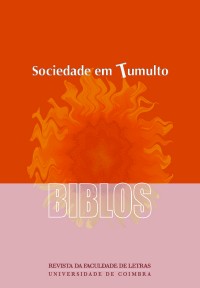Please use this identifier to cite or link to this item:
https://hdl.handle.net/10316.2/32716| Title: | Vegécio e a prática militar medieval: influência real e condicionalismos | Authors: | Monteiro, João Gouveia | Keywords: | Medieval warfare;Roman army;Military treatises;Arte militar medieval;Exército romano;Tratados militares | Issue Date: | 2009 | Publisher: | Faculdade de Letras da Universidade de Coimbra | Abstract: | In the late 4th and early 5th century, a Latin author named Flavius Vegetius
Renatus wrote a treatise on the art of warfare (Epitoma rei militaris) which would
become one of the most copied and translated classical works in the European
Occident until the Renaissance. Over the last one hundred years, historians have
passionately debated the influence that this treatise might have had on medieval
generals’ practice of warfare. The pro-Vegetius thesis defended by Henri Delpech
(1885-1886) and his followers gave rise to sharp rebuttals from renowned authors such as R. C. Smail (1956). Between both extremes, moderate interpretations
also appeared, such as that of Philippe Contamine (1980). This article sums up
this debate, re-assesses the relevance that Vegetius’s precepts might have had
for medieval military chiefs (based on the studies of P. Richardot, 1998, and
C. Allmand, 1998 and 2001), and revisits the case of Foulque Nerra, Count of
Anjou (987-1040), presented for the first time in 1985 by Bernard Bachrach,
which is used here as a model for future research in Portugal and elsewhere. No final do séc. IV ou nos inícios do séc. V, um autor latino de nome Flávio Vegécio Renato compôs uma arte da guerra (a Epitoma rei militaris) que viria a tornar-se numa das obras clássicas mais copiadas e traduzidas no Ocidente europeu até ao Renascimento. Ao longo dos últimos 100 anos, os historiadores têm debatido com paixão a influência que este tratado pode ter tido na prática da guerra pelos generais medievais. A tese pró-vegeciana de Henri Delpech (1885-1886) e seus seguidores suscitou respostas contundentes de autores consagrados como R. C. Smail (1956). Entre um e outro extremos, surgiram interpretações moderadas como a de Philippe Contamine (1980). Neste artigo, faz-se o balanço desse debate, reavalia-se (com base nos estudos de P. Richardot, 1998, e de C. Allmand, 1998 e 2001) a actualidade que os preceitos de Vegécio poderão ter tido para os chefes militares medievais e recupera-se o caso de Foulque Nerra, conde de Anjou (987-1040), apresentado pela primeira vez em 1985 por Bernard Bachrach e aqui utilizado como modelo para investigações futuras, incluindo em Portugal. |
URI: | https://hdl.handle.net/10316.2/32716 | ISSN: | 0870-4112 | DOI: | 10.14195/0870-4112_7_5 |
| Appears in Collections: | Biblos |
Files in This Item:
| File | Description | Size | Format | |
|---|---|---|---|---|
| biblosvii_artigo5.pdf | 833.2 kB | Adobe PDF |  |
Items in DSpace are protected by copyright, with all rights reserved, unless otherwise indicated.
